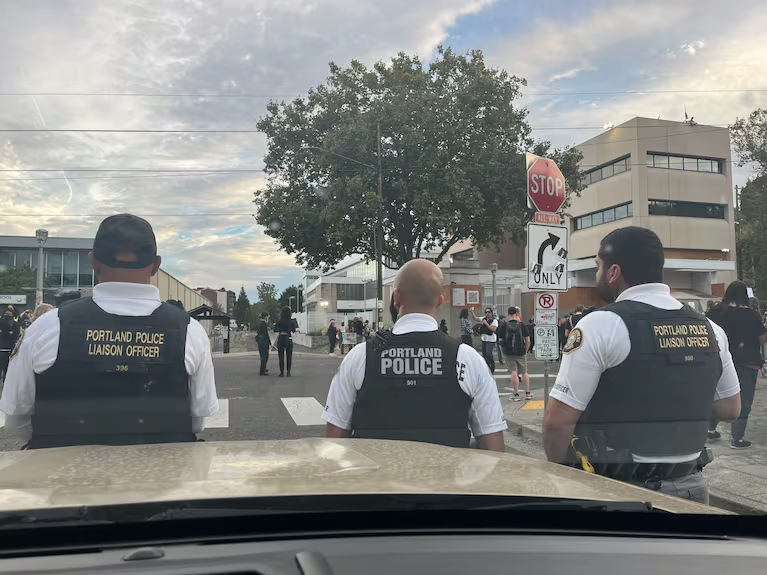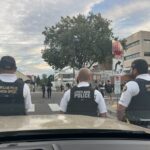Protests outside the Immigration and Customs Enforcement (ICE) facility in South Portland have remained mostly calm, even as former President Donald Trump continues to call—unsuccessfully—for National Guard troops to be deployed. Local authorities say the relative peace is no accident. They credit a more deliberate, communication-centered approach to handling demonstrations.
A Shift From 2020 Tactics
In a September interview on “Think Out Loud,” Portland Police Chief Bob Day described how the bureau has intentionally moved away from the strategies used during the 2020 protests.
A key part of that shift is the introduction of Dialogue Liaison Officers (DLOs). These officers, easily recognized by their white shirts and special training, attend demonstrations early to build communication, reduce misunderstandings, and create pathways to de-escalation.
Also Read
“The use of our Dialogue Officers has been so significant,” Day said. “They establish communication, provide off-ramps, and help take the temperature down.”
The Role of Dialogue Liaison Officers
Two of the officers at the heart of this effort are Sergeant Daniel DiMatteo and Officer Jessica Ruch. Both volunteer for DLO duties on top of their regular assignments.
Ruch said the work feels like a natural extension of her role on patrol.
“I like having those conversations with people,” she said. “On patrol, there’s always another call waiting. Here, I get the chance to have longer conversations about what their interactions with us mean. That’s rewarding.”
DiMatteo said reactions from protest participants are mixed—and often extreme.
“You get people yelling the worst things you can imagine,” he said. “But others come up to thank us for being there and helping keep everyone safe.”
Despite the range of emotions, he said he focuses on the bigger picture: protecting free speech and maintaining safety.
Handling Hostility Without Escalation
Both officers say they take negative remarks in stride, recognizing that intense emotions are part of the environment.
“For me, it doesn’t bother me,” DiMatteo said. “They’re mad at the government, at the institution, or the uniform. It’s anger—not personal.”
Ruch added that political disagreements at demonstrations carry a unique weight.
“These aren’t small arguments or minor differences of opinion,” she said. “These are life-changing questions. People show up with deep emotions.”
For that reason, she said the best approach is to stay grounded and human. “Just be there for them. Talk to them. Ask what they think the future should look like.”
A New Approach to Community Policing
The Dialogue Liaison Officer program is still relatively new, but officers say they’re seeing genuine engagement.
DiMatteo said many protesters respond positively to the presence of DLOs, though some remain cautious given past tensions with police.
“They say it’s a good approach, but there’s still wariness,” he said. “I understand that lack of trust. I tell them we’ll take as much time as needed to rebuild it. Let’s see where this can go.”
The bureau views the program as part of a larger effort to rethink public safety practices, particularly around protests where emotions and political beliefs collide.
Keeping Peace at a Highly Charged Site
The ICE facility in South Portland has long been the site of demonstrations, counterprotests, and community tension. In recent months, however, local law enforcement has successfully managed conflicts and limited arrests to individuals who commit property damage or other crimes.
Officers say that maintaining communication across groups—protesters, counter-protesters, and police—helps prevent confrontation from escalating into violence.
The DLO program is part of the bureau’s broader commitment to reducing tensions and using dialogue as a primary tool for conflict management.
Building Trust, One Conversation at a Time
While the bureau acknowledges trust cannot be rebuilt overnight, DLOs say they see meaningful progress in small moments: a productive conversation, a calmer crowd, or a protester willing to share concerns.
For Ruch, the value lies in connecting with people on a human level.
“It’s about being present,” she said. “Listening, talking, understanding what people are fighting for.”
For DiMatteo, it’s about reinforcing the core purpose of their presence.
“We’re there to protect everyone’s right to free speech,” he said. “That’s the job, and these conversations help us do it.”
As protests continue and political tensions remain high, Portland Police say they plan to keep investing in outreach-driven approaches—and hope the foundations being laid today will support stronger community relationships in the years ahead.












